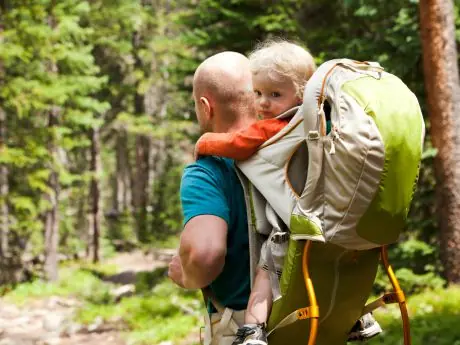Stay in sight.
It's great to let kids have some independence on the trail, but don't let them run too far ahead and out of sight. If they reach a fork in the trail, make sure your kids know to stay put and wait for you to catch up.
Pay special attention to teens.
Young children pose their own safety concerns; they tend to trip more and get distracted. However, teenagers pose a special risk on the trail. The teenage brain can be fearless and not always consider the consequences of their actions. But that doesn't mean your teen isn't capable of making good decisions outdoors. Talk to them about common trail dangers--like jumping from cliffs into bodies of water or scrambling on rocks that could slide or fall. Even teens can be taught to respect the outdoors and their own limitations.
Wear proper clothing.
In the mountains, a sunny day can morph into a gray-skied thunderstorm in a matter of minutes. You should always be prepared for a change in weather. Hike in synthetic clothing that wicks water and dries quickly, and carry rain gear and a fleece in your backpack, as well as a hat and gloves. In cold weather, proper clothing can save you from hypothermia. Carrying extra clothes may seem excessive, but one blip in the weather or wrong turn on the trail and extra clothing can make a big difference in the comfort and safety of everyone involved.
If they get lost, have a plan.
Talk to your kids about what to do if they should get separated from you on the trail. Experts agree it is much harder to find a child who is moving, so tell your kids to stay in one place and wait for help to arrive. Keep a safety whistle in their backpacks and make sure they know to blow it should they get lost. Teach them how to unwrap and use their emergency blanket and how to utilize each of their 10 Essentials. It's also important to let kids know they won't be in trouble if they do get lost. Some kids resist calling out for help because they're worried about getting in trouble once found. Let them know their safety is always your number one concern.
Arm kids with their own skills.
Once your kids are old enough to venture into the woods alone, arm them with knowledge. For outdoorsy teens, wilderness first aid courses make great gifts. Show your kids how to use water filters, teach them how to identify poisonous plants and coach them through setting up an emergency shelter. The best outdoors experience you can give your child is the ability to be safe and responsible.
- 2
- of
- 2









Discuss This Article